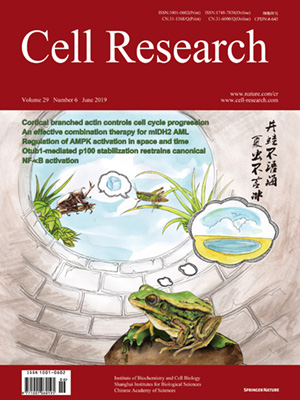
Volume 29, No 6, Jun 2019
ISSN: 1001-0602
EISSN: 1748-7838 2018
impact factor 17.848*
(Clarivate Analytics, 2019)
Volume 29 Issue 6, June 2019: 432-445 | Open Access
ORIGINAL ARTICLES
Cortical branched actin determines cell cycle progression
Nicolas Molinie1 , Svetlana N. Rubtsova 1,2 , Artem Fokin1 , Sai P. Visweshwaran 1 , Nathalie Rocques1 , Anna Polesskaya1 , Anne Schnitzler3 , Sophie Vacher3 , Evgeny V. Denisov 4,5 , Lubov A. Tashireva4 , Vladimir M. Perelmuter4 , Nadezhda V. Cherdyntseva 4,5 ,
Ivan Bièche3 and Alexis M. Gautreau 1,6
1 BIOC, Ecole polytechnique, CNRS, IP Paris, Palaiseau, France; 2N.N. Blokhin National Medical Research Center of Oncology, Moscow, Russia; 3Department of Genetics, Institut Curie, Paris, France; 4Tomsk National Research Medical Center, Tomsk, Russia; 5Tomsk State University, Tomsk, Russia and 6School of Biological and Medical Physics, Moscow Institute of Physics and Technology, Dolgoprudny, Russia
Correspondence: Alexis M. Gautreau (alexis.gautreau@polytechnique.edu)
The actin cytoskeleton generates and senses forces. Here we report that branched actin networks from the cell cortex depend on ARPC1B-containing Arp2/3 complexes and that they are specifically monitored by type I coronins to control cell cycle progression in mammary epithelial cells. Cortical ARPC1B-dependent branched actin networks are regulated by the RAC1/WAVE/ARPIN pathway and drive lamellipodial protrusions. Accordingly, we uncover that the duration of the G1 phase scales with migration persistence in single migrating cells. Moreover, cortical branched actin more generally determines S-phase entry by integrating soluble stimuli such as growth factors and mechanotransduction signals, ensuing from substratum rigidity or stretching of epithelial monolayers. Many tumour cells lose this dependence for cortical branched actin. But the RAC1-transformed tumour cells stop cycling upon Arp2/3 inhibition. Among all genes encoding Arp2/3 subunits, ARPC1B overexpression in tumours is associated with the poorest metastasis-free survival in breast cancer patients. Arp2/3 specificity may thus provide diagnostic and therapeutic opportunities in cancer.
https://doi.org/10.1038/s41422-019-0160-9
FULL TEXT | PDF
Browse 1235


